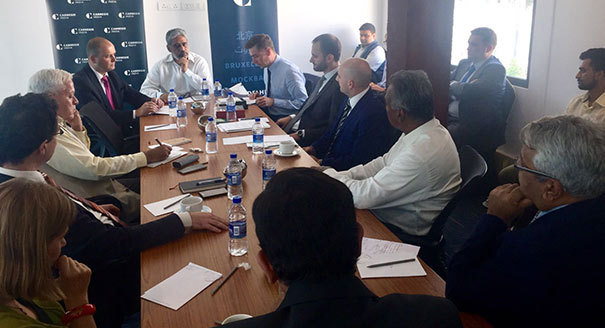Registration
You will receive an email confirming your registration.
The three Baltic states of Estonia, Latvia, and Lithuania have rapidly growing economies, and are members of the European Union as well as the North Atlantic Treaty Organisation (NATO). In the face of a more assertive Russia, a distracted United States, and an active China, the strategic significance of the Baltic region has grown rapidly. The recent visit by Indian Minister of State for External Affairs M.J. Akbar suggests that India is beginning to pay attention to the region.
Carnegie India hosted a private roundtable discussion on India’s engagement with Estonia, Latvia and Lithuania. The discussion was initiated by Laimonas Talat-Kelpša, ambassador of Lithuania to India, Riho Kruuv, ambassador of Estonia to India, and Aivis Klavinskis, deputy head of mission of the embassy of Latvia in India, and chaired by C. Raja Mohan, director of Carnegie India.
Discussion Highlights
- Baltics as a Region: Participants agreed that the “Baltics” are a somewhat artificial regional construct, given that their recent history has been overshadowed by membership of EU and NATO. However, what brings them together is their shared history over the past centuries. Participants explained that the three states gained independence from the Soviet Union simultaneously, undertook domestic reforms transforming into liberal market economics, and emerged as success stories among EU member-states. The three states’ foreign policies are very diverse, they added, and are carried out in coordination with each other. The three states also share historical, geographical, and linguistic similarities, participants said.
- Underdeveloped Indo-Baltic Ties: Historic contacts, and common linguistic roots, have contributed to a positive public sentiment towards India in the Baltic states, discussants said. Participants pointed out that political engagement between the region and India dates to the 1920s at the League of Nations. However, participants said that the subsequent decades of occupation by the Soviet Union interrupted the development of bilateral relations, which remain underdeveloped even today. Participants expressed concern over the seemingly accidental nature of foreign office level consultations, and infrequent high-level visits from India. The Baltics, given their small size and population, tend to be ignored during India’s engagement with the EU and in multilateral fora. In the case of the latter, there is little effort towards consultation with the Baltic states on issues such as the Nuclear Suppliers Group’s expansion.
- A Strategic Spin for Indo-Baltic Ties: To make India’s approach toward the region more coherent, participants emphasized the need to establish an Indian embassy to the Baltics, and restructure the Central Europe Division in the Indian Ministry of External Affairs, which oversees the three Baltic states as well as other non-EU states. Participants spoke about the need to “up the profile of the Baltics” in the Indian consciousness, given the fundamental importance of small states today, and to step up the momentum in all areas of bilateral cooperation. With an eye towards the Baltic states’ potential to serve as a gateway into the EU, participants suggested that India should consider engaging with the region through formats that include other Nordic (e.g., the Nordic-Baltic Eight format) and/or EU member states, which is something China is already pursuing. Participants pointed out strategic similarities between India, and the Baltic states (all four of them share borders with nuclear states) as well as their common position on terrorism. Participants agreed on the point that India must neither view the Baltic states from the prism of its ties with Russia, nor overlook the importance of the EU or of small states within the same.
- Expansion of Cooperation: While trade between India and the Baltic states has seen recent growth, it remains very low, participants said. Given their economic and technological vitality, as well as their membership of EU, the Baltic states have special strengths as compared to the Nordic states, they argued. Participants pointed out synergies that exist between the technological edge of companies in the Baltics and the wider global reach of Indian companies. The innovative spirit of the Baltics also complements Indian developmental needs, they added, with opportunities in areas such as lasers, e-governance, education, and waste-to-energy. Participants also suggested that training in Indian languages, by leveraging the Indian languages departments of Baltic universities, would allow Baltic nationals greater ease in doing business in India. Highlighting the potential of Bollywood movies for boosting tourism, participants discussed the possibility of promoting the Baltic region as a destination by launching projects to deliver services that an Indian film producer might need. Introduction of Indian Studies departments in the Baltic universities as well as fostering cooperation among think tanks, participants concluded, and media could also help deepen Indo-Baltic ties.
This event summary was prepared by Sharanya Rajiv, a researcher with Carnegie India, with inputs from Srijan Shukla, an intern with Carnegie India
